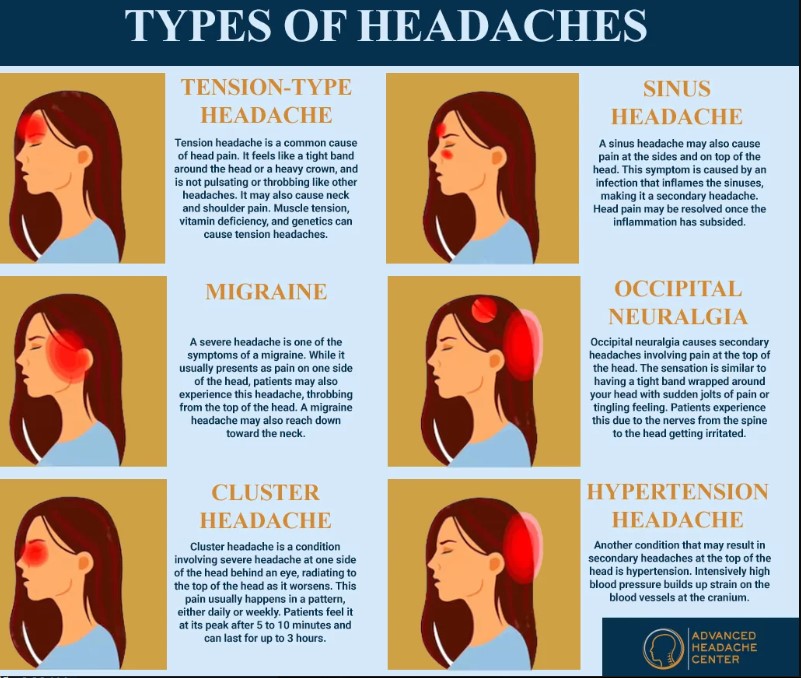BOURSESSENEGAL – Headaches are one of the most common ailments that people experience. While they may seem simple, headaches can vary widely in type and severity. Understanding the different types of headaches helps you manage them more effectively and seek appropriate treatment. This guide will dive deep into the various types of headaches, their symptoms, causes, and potential treatments.
What Are Headaches?
A headache is a pain in the head, scalp, or neck. They can affect anyone and can happen at any time. While occasional headaches are normal, frequent or severe headaches can significantly disrupt your daily life. Understanding the types of headaches can empower you to take proactive steps toward relief.
Common Types of Headaches
1. Tension Headaches
Symptoms of Tension Headaches
Tension headaches are the most common type. They often feel like a tight band around your head. Symptoms include:
- Mild to moderate pain
- Tenderness around the forehead, temples, or back of the neck
- Pain that is often bilateral (affecting both sides of the head)
Causes of Tension Headaches
Tension headaches may arise due to:
- Stress and anxiety
- Poor posture
- Eye strain from excessive screen time
- Lack of sleep
Treatment Options for Tension Headaches
You can often manage tension headaches with:
- Over-the-counter pain relievers like ibuprofen or acetaminophen
- Relaxation techniques such as yoga or meditation
- Regular breaks when using screens
2. Migraines
Symptoms of Migraines
Migraines are more intense and can last for hours or even days. Symptoms include:
- Throbbing or pulsing pain, often on one side of the head
- Nausea or vomiting
- Sensitivity to light and sound
- Aura symptoms, such as visual disturbances
Causes of Migraines
Migraines can be triggered by various factors, including:
- Hormonal changes
- Certain foods and drinks (like aged cheese and alcohol)
- Environmental factors (like strong smells or bright lights)
- Stress
Treatment Options for Migraines
Managing migraines may involve:
- Prescription medications specifically for migraines
- Lifestyle changes to identify and avoid triggers
- Preventative treatments, such as beta-blockers or anti-seizure medications
3. Cluster Headaches
Symptoms of Cluster Headaches
Cluster headaches are one of the most painful types of headaches. They occur in cyclical patterns or clusters. Symptoms include:
- Severe, sharp pain around one eye
- Red or watery eyes
- Nasal congestion or runny nose on the affected side
- Agitation or restlessness during attacks
Causes of Cluster Headaches
The exact cause of cluster headaches isn’t well understood, but they may relate to:
- Abnormalities in the hypothalamus
- Alcohol consumption during a cluster period
- Smoking
Treatment Options for Cluster Headaches
Effective treatments include:
- Oxygen therapy
- Prescription medications like triptans
- Preventative treatments, such as corticosteroids
4. Sinus Headaches
Symptoms of Sinus Headaches
Sinus headaches occur when sinuses become inflamed or congested. Symptoms include:
- Deep, constant pain in the cheekbones, forehead, or bridge of the nose
- Nasal discharge
- Fever
- Swelling in the face
Causes of Sinus Headaches
Sinus headaches are typically caused by:
- Sinus infections (sinusitis)
- Allergies
- Nasal polyps
Treatment Options for Sinus Headaches
To relieve sinus headaches, consider:
- Decongestants
- Nasal sprays
- Warm compresses on the face
5. Hormonal Headaches
Symptoms of Hormonal Headaches
Hormonal headaches are linked to hormonal fluctuations. Symptoms can resemble migraines, such as:
- Throbbing pain, often on one side of the head
- Nausea
- Sensitivity to light and sound
Causes of Hormonal Headaches
These headaches often occur due to:
- Menstrual cycles
- Pregnancy
- Hormonal therapies or birth control
Treatment Options for Hormonal Headaches
Managing hormonal headaches might include:
- Hormonal medications
- Lifestyle modifications, like exercise and a balanced diet
6. Rebound Headaches
Symptoms of Rebound Headaches
Rebound headaches occur when pain relievers are overused. Symptoms include:
- Daily headaches
- Worsening pain after medication wears off
- A cycle of pain relief followed by pain
Causes of Rebound Headaches
These headaches stem from:
- Overuse of pain relief medications
- Dependency on certain treatments
Treatment Options for Rebound Headaches
To break the cycle, consider:
- Gradually reducing medication use
- Seeking advice from a healthcare provider
When to Seek Medical Help
While most headaches are manageable at home, certain symptoms warrant a visit to a healthcare professional. You should seek medical help if you experience:
- A sudden, severe headache
- Headaches that worsen or change in pattern
- Accompanying neurological symptoms (like confusion or difficulty speaking)
Conclusion
Understanding the types of headaches can significantly improve your ability to manage and treat them. Whether you experience tension headaches, migraines, cluster headaches, sinus headaches, hormonal headaches, or rebound headaches, knowing their symptoms and causes helps you seek appropriate treatment. If your headaches persist or worsen, don’t hesitate to consult a healthcare professional. With the right knowledge and care, you can find relief and improve your quality of life.
REFERENCE : https://www.cdcfoundation.org/



